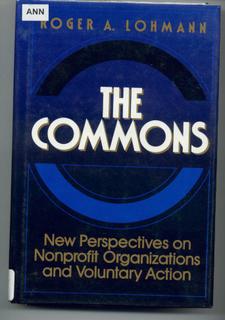
This is a Jossey-Bass book and it's getting a wee bit long in the tooth. It is copyright 1992 but feels much older than that. It is quite theoretical and academic, not that there's anything wrong with that. NB: I got a little tired of it and just skimmed thru so take my opinion with a grain of salt.
To cut to the chase, the "theory of the commons" is based on nine assumptions, so let the debate begin.
1. Social Action: that a characteristic of a nonprofit and/or voluntary service is its intangibility.
I think this is not really true. I think a lot of junior league types spend a lot of time on "intangibles," but a lot of people I know in the nonprofit sector are awful worried about outcomes. My perspective is that it's a crappy nonprofit that assuages its conscience with complaints of its work being "intangible." Every nonprofit should come up with some kind of indicator or deliverable to justify its existence. Otherwise, leave the money for someone who can.
2. Affluence: This one seems like a hierarchy of needs issue. If people don't have their basics down pat, no one can participate in the betterment of society. Makes sense to me.
3. Authenticity: the theory "assumes that actors operating in nonprofit and voluntary settings are authentic, that is, they are what they appear to be to informed others operating in the same context." So anyone who is not authentic is subject to excommunication from the commons, and laws help inforce this (e.g. IRS's enforcement of charitable tax fraud).
4. Continuity: This part is really wordy and marginally comprehensible. But basically, I take from it that these are "traditional" organizations--the past matters, and people know have a duty to plan for the future to preserve the heritage of the community.
5. Rationality: That people aren't crazy. Shouldn't I have this?
6. Near-Universality: that the whole democratic idea of a "commons" is near-universal, "known in some manner in most, possibly all, human cultures." I suppose that this position seemed pretty sensible in 1992, before the postmodern neo-hippies of 2003 convinced us that really, some people must not be cut out for self-governance.
7. Autonomy: volunteers and such in these organizations are free to act for themselves. Or rather, that they are "capable" of doing so. "The ability to act with others to create and sustain and autonomous social world is one of the most fundamental characteristics of nonprofit and voluntary action." This part makes sense to me.
8. Intrinsic Valuation: whoa, on the lingo there. Evaluations of a given "commons," or "an autonomous common world," should be made from the values that arise from it. Is that like in the Bible "you shall know them by their fruits?" Or, is it the values that the group espouses. Those are different sometimes. Anyway, basically this one denies that a group should have to be accountable in any practical way for any of its outcomes. I'm not a fan of that idea.
9. Ordinary Language: "a satisfactory theory of nonprofit and voluntary action must be stated in language that philanthropic, charitable and altruistic actors can recognize and understand." This is pretty unclear, and doesn't quite rank with the other points listed.
So that's a resume of the "theory of the commons." I'm kind of an outcomes-oriented nonprofit/trade association/lobbying type so naturally I'm probably not the target audience for this work. Maybe if I were more of a charity, foundation environment it would be more useful.
By Roger A. Lohmann